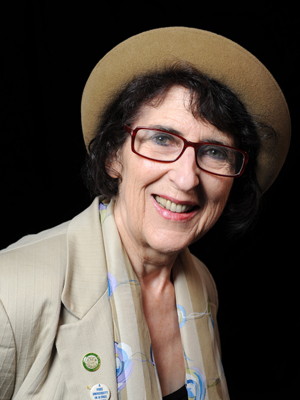Glimpses
Carol Ruth Silver
By Amy Braverman Puma
Photography by Dan Dry

Carol Ruth Silver, AB’60, JD’64
Carol Ruth Silver, AB’60, JD’64, has been raising eyebrows over her politics all her life. In her third year of high school, she persuaded her mother, who quit school at 14, to join an adult-education discussion group at the Worcester, Massachusetts, public library—sponsored by the University of Chicago—so Silver also could partake in the geopolitical conversations. When the discussion broached Africa, Silver declared that the British should simply get out. “Everybody laughed,” she says. But when indeed a few years later the British were “tossed out,” she took it as validation that she knew “what’s right.”
Silver—who won a 2009 Alumni Association Public Service Citation—then channeled her sense of what’s right to plan protests in solidarity with sit-ins in the South, gathering fellow U of C students to picket Woolworth’s (1960); to join the civil-rights Freedom Rides and be incarcerated for 40 days in Jackson, Mississippi (1961); to serve, alongside Harvey Milk, on San Francisco’s Board of Supervisors (1977–89) as the “first out-of-the-closet, unwed mother,” as she puts it; to found the country’s first Mandarin-immersion program in San Francisco so her older son, adopted from Taiwan, could learn in his native language (1981); to set up education programs for Afghan women and children (since 2002); and, most recently, to quit her post as a prison lawyer with the San Francisco Sheriff’s Office to join the drug-legalization movement (2009).The price of Freedom Rides: At the Mississippi border, highway patrol cars fell in behind us. We didn’t know whether they were escorting us to keep us safe from the Ku Klux Klan as we drove through rural areas or whether they were there to stop the bus at some place and pull us out and lynch us. There were six of us [Freedom Riders on the Greyhound bus]. We sang. The segregated bus had the African American guys sitting toward the back, so [the two other whites and I] all went to the back.
In Jackson we got off the bus, and the three of us who were white marched on toward the colored waiting room, and the three who were African American marched on toward the white waiting room, and we entered. And here was Sergeant Tyson, this huge, white, Mississippi trooper or sheriff, standing in the middle of the room. And he said, “Y’all move on.” I said, “I just want to use the restroom.” And then he said, “Y’all are under arrest.”
To Afghanistan and back: My younger son had joined the Army and was in the 82nd Airborne in September 2001. He got shipped off to Afghanistan in one of the first waves of Operation Enduring Freedom. And as a mother, all I knew was that somebody was shooting at my little boy. I couldn’t think. I couldn’t work. I couldn’t do anything except think about my son being over there. So to pull myself out of this, I decided that if America was in the process of bombing Afghanistan, then the next proper step was for America to put it back together again.
So I went to Kabul in June 2002 and came back to raise money for education. After another trip delivering funds for a women’s literacy project in Ghazni, I said, “This is not a sustainable way to develop education for Afghanistan. We have to help them create education in a much bigger way.” In 2006 I founded yet another organization, called Master Teachers by Satellite for Afghanistan, now focused on One Laptop Per Child, which came out of the Media Lab at MIT. We are trying hard to set up a way of delivering laptops to children in Afghanistan who do not have schools.
War on the War on Drugs: As the director of prisoner legal services for the San Francisco County Jail, I took on responsibility for the women’s jail, talking with the mostly single mothers about their child-care arrangements. And I became progressively more distressed as I realized that more than 60 percent of these women were in our jail solely because of a nonviolent drug charge. How could I look her in the eye, this woman for whom I was preparing papers, which she had requested me to create, to give over the custody of her children to a relative? I knew statistically the relative was going to fail, was going to abuse the children, was going to neglect the children. And eventually the mother is going to lose the children. She may never see them again. So I resigned and joined Law Enforcement Against Prohibition. All drug prohibition should be repealed, and we should tax and regulate it.
